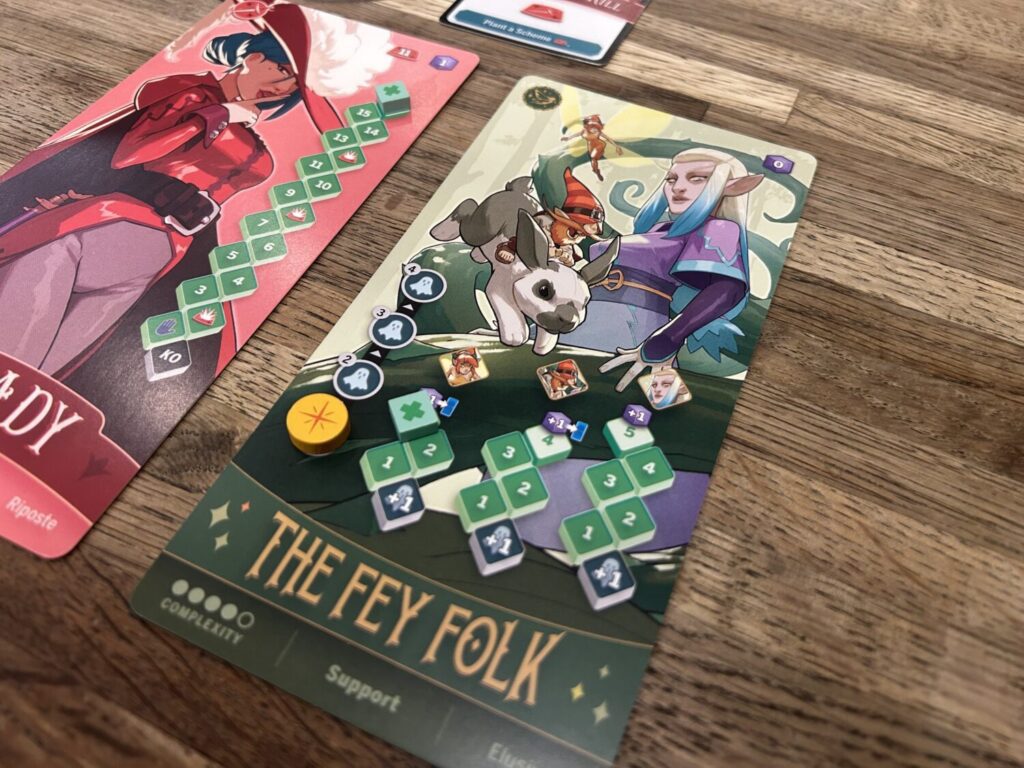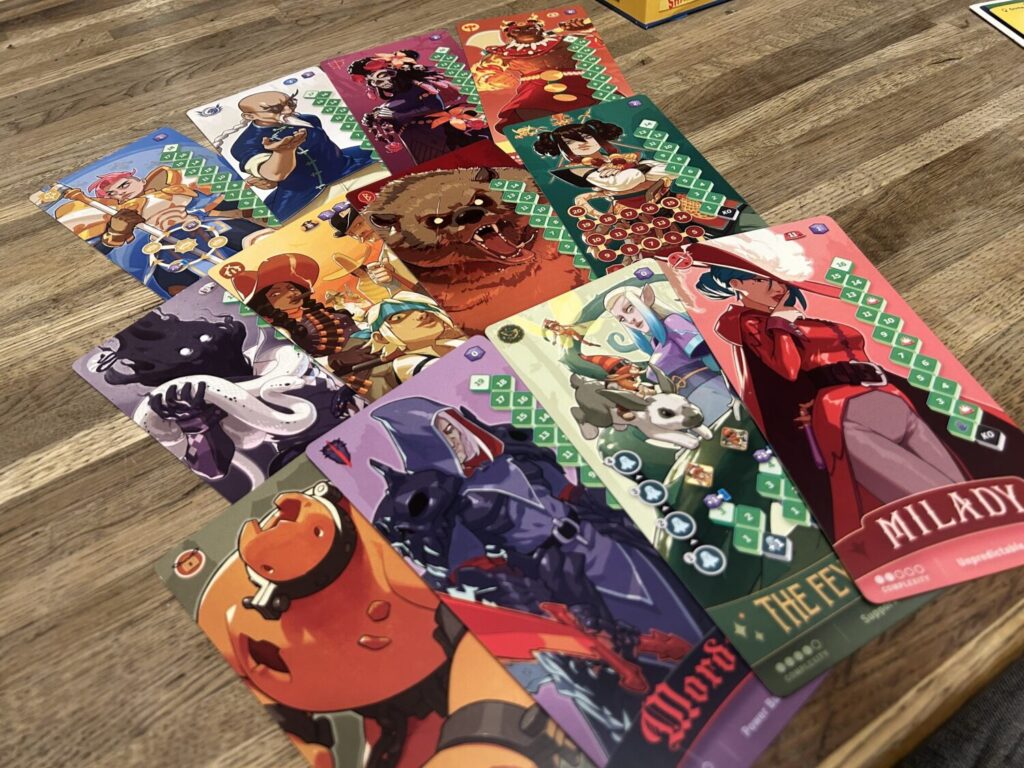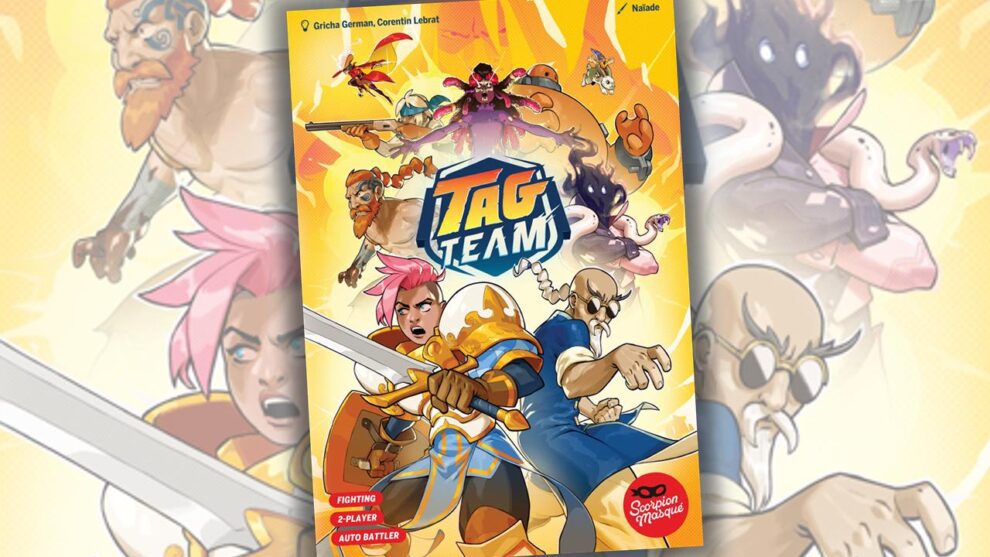Disclosure: Meeple Mountain received a free copy of this product in exchange for an honest, unbiased review. This review is not intended to be an endorsement.
I have to give in to peer pressure on this one, I think. As a reviewer, it is incumbent on me not only to relay my own opinions, but to reflect the opinions of those around me, to create a sort of gesamtkritikerwerk that relates not only what I think of a game, but also what the reader may think, and why those opinions may differ. In the case of Tag Team, from designers Gricha German and Corentin Lebrat and publisher Scorpion Masqué, I will need to lean on popular opinion more than normal.
For reasons I didn’t understand before writing this review, my thoughts on Tag Team are about as flat as a cardiogram for a corpse. That doesn’t mean I have a negative opinion of it. I don’t. If I start to sit down and talk about it beat by beat, I have mostly glowing things to say about it. Not quite as glowing as Justin, but glowing nonetheless. Still, when I hear the game mentioned, or I consider the concept of playing it in the abstract, I feel nothing.

One Punch, Man
I was pretty excited about Tag Team when I first caught wind of it last fall. It’s an autobattler in which both players have two fighters. The hook for me was the mechanism by which you control your fighters, and it remains delightful. Over the course of the game, you build an increasingly large deck of cards, each of which represents a specific attack or action from one of your two characters. The order of the deck is fixed. You add a card at the end of each round, but you choose where to slot it and lo there it stays.
Each round, both players reveal the top card of their deck simultaneously and resolve it. If we both play attacks—this is less likely than you’d think, especially if you start playing around with the higher-complexity characters—then the character I revealed does damage to the character you revealed, and vice-versa. If I revealed an attack and you revealed a block, my attack does nothing. If either of us reveals some other form of card, such as a healing effect or a character-specific action, it resolves likewise. Then we reveal the second card from each of our decks, and on and on.
This system is very good. There are no turns, so neither player gets bored, and there are no decisions during the fight itself, which keeps things punchy. I mentioned before that a card gets added at the end of each round; you draw three from a side deck that contains all the non-starting cards for each of your characters, and then choose one. Much of the joy of Tag Team is in this moment, in deciding which card to add and where to add it.
There are elements of engine building. The more complex characters have surprisingly finicky (non-derogatory) mechanics, which need to be timed correctly relative either to themselves or to your opponent. There are also, more to my liking, elements of double-think. I know where my opponent’s big attack is in their deck, so I should line this new block card up with that. Then again, they know I know where it is, so maybe they’ll add something before it to shift it into a new position, so would it be smarter for me to add it one spot later…Impossible to say, truly.
As a result, your carefully arranged plays will often dissolve into nothing, but those moments when you do successfully parry or block or turn the tide are exhilarating. My favorite card in the game allows you to instantly win the game if your opponent would kill you with whatever card they reveal on the same turn. If you manage to line that sucker up, boy, there’s nothing like it.

Oh, Oh, It’s Magic
And yet, as I said at the beginning of this review, Tag Team felt flat. I was never into it. On a hunch, I had a couple of Magic players sit down with it while I observed, glasses on and notebook in hand. As I expected, they thoroughly enjoyed it. Tag Team is, of course, much more approachable than Magic, but it taps into the same sources of pleasure.
This, I realize, is why I’m cool on it. Magic is a game about creating an algorithm and then watching it run. Much of the joy and creativity in the game happens outside of the matches themselves, in the constant tinkering with and fine-tuning of decks of cards that represent your tastes and ideas as a player. I play boardgames because I want to be forced into a mode of thinking, to form my thoughts like water in a glass and then gently lap away at the edges until I can break through. Magic is about creation. Most board games are about experiencing. It’s a matter of finding pleasure in two different portions of the same larger activity.
Tag Team is quick and silly, which is exactly what it sets out to be. Artist Xavier Gueniffey Durin understood the assignment, fleshing out each character board with vibrant colors and eye-catching designs. There’s already an expansion on the way, and I suspect this game will do great once it hits retail. I probably won’t be playing, but I suspect a lot of people will be.











